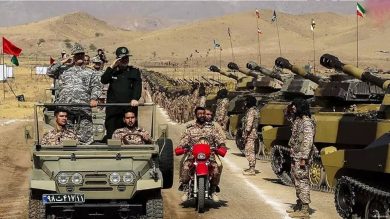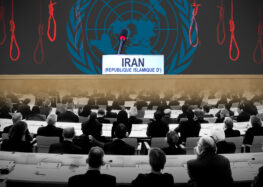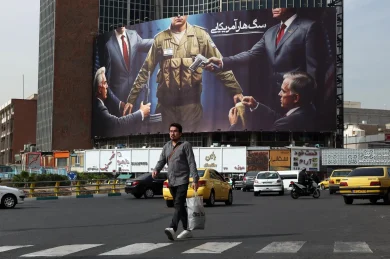In the wake of mass protests and brutal crackdowns in Iran, one voice has risen in clarity, resilience, and determination — the voice of the Iranian diaspora, especially Iranian women abroad. These women, spread across the globe, have become crucial agents in amplifying the call for freedom, justice, and equality, standing in solidarity with those risking their lives back home. From organizing global rallies to speaking in international forums, Iranian women in the diaspora are helping to shine a spotlight on the Islamic Republic’s human rights abuses, particularly the violent suppression carried out by the Islamic Revolutionary Guard Corps (IRGC).
As the movement for “Women, Life, Freedom” continues to reverberate from Tehran to Toronto, from Shiraz to Stockholm, it becomes increasingly evident that this revolution is not confined by geography — it is global, and the diaspora is essential to its momentum.
1. A Revolution Without Borders
The death of Mahsa Amini in September 2022 sparked not just national outrage but a global movement. Iranian women abroad played a pivotal role in turning a moment into a movement. From the very start, they organized protests in cities like Berlin, Paris, Washington D.C., London, and Sydney, drawing international attention to what was unfolding inside Iran.
These women, many of whom fled Iran to escape political persecution, forced veiling, or gender-based discrimination, now use their freedom of speech as a tool of resistance and advocacy.
Key Roles Played by Iranian Women in the Diaspora:
• Organizing protests and vigils
• Lobbying foreign governments and parliaments
• Engaging with international media
• Mobilizing communities through social media campaigns
• Supporting jailed activists and their families
2. Diaspora Advocacy: From Streets to Parliament
Iranian women activists abroad have been instrumental in lobbying foreign governments to take firmer stances against the Islamic Republic. One of their key demands has been the designation of the IRGC as a terrorist organization, citing its role in systemic repression, extrajudicial killings, and global terrorism.
Notable Achievements:
• Petitions and open letters that gained millions of signatures
• Testimonies before government bodies, including the U.S. Congress, Canadian Parliament, and European Parliament
• Successful lobbying efforts to sanction Iranian officials, including judges, intelligence agents, and IRGC commanders
• Campaigns that led to major cities and universities declaring support for the “Women, Life, Freedom” movement
Their work has turned Iran’s internal struggle into an international cause, forcing the world to listen and act.
3. Voices of the Diaspora: Leading Figures
Several Iranian women in exile have become global symbols of resistance, using their platforms to fight for freedom and amplify the voices of women and activists inside Iran.
Masih Alinejad
A journalist and human rights activist based in the U.S., Alinejad founded the #MyStealthyFreedom campaign and has been an outspoken critic of forced hijab laws. Despite assassination and kidnapping attempts by IRGC-linked operatives, she continues to lead international efforts for Iranian women’s rights.
Shirin Ebadi
The Nobel Peace Prize laureate and former judge lives in exile and tirelessly advocates for human rights and democracy in Iran. She uses her voice to connect legal reforms and gender justice on the international stage.
Roya Hakakian, Niloofar Rahmani, and many others
These women represent different generations and backgrounds but are united by a shared purpose: ensuring that the struggles of women inside Iran are not forgotten or ignored.
4. Social Media: A New Battlefield
Social media has emerged as a powerful weapon in the hands of the diaspora. Women abroad are leveraging platforms like Instagram, Twitter (X), TikTok, and YouTube to:
• Share videos of protests and government crackdowns
• Translate and disseminate the messages of activists inside Iran
• Expose the IRGC’s disinformation campaigns
• Organize global actions and awareness campaigns
Hashtags such as #MahsaAmini, #WomenLifeFreedom, #BanIRGC, and #FreeIran have gone viral, gaining support from global influencers, celebrities, and media outlets.
5. Building a Bridge: Support for Families and Prisoners
The diaspora also plays a vital humanitarian role. Iranian women abroad have created networks to support families of those killed or imprisoned in Iran. Their efforts include:
• Raising funds for legal support
• Providing mental health resources
• Connecting families with international human rights organizations
• Highlighting the names and stories of political prisoners
This connection has ensured that the human cost of the revolution is never lost in statistics or forgotten in headlines.
6. Art, Culture, and Resistance
Diaspora artists, musicians, filmmakers, and writers — many of them women — are using their work to challenge the regime’s narrative, preserve Iranian culture, and promote resistance through creativity.
Notable examples include:
• Documentaries on Iranian women’s resistance
• Poetry readings and art exhibitions centered on the movement
• Film festivals and panel discussions elevating voices from Iran
Art is not just expression — it’s a form of activism. In exile, it becomes a bridge between past and future, between homeland and the world.
7. Global Challenges and Backlash
The work of diaspora women is not without risk or criticism. Many face:
• Threats and intimidation from IRGC-linked operatives abroad
• Online harassment and cyberattacks
• Surveillance and monitoring of their activities by Iranian intelligence
• Accusations of foreign interference from pro-regime supporters
Yet, despite these dangers, they continue to lead, proving that distance does not weaken commitment — it strengthens it.
8. The Diaspora’s Role in Iran’s Future
As calls for a referendum, constitutional change, or even a secular republic grow louder, many believe that the diaspora — especially women — must have a seat at the table in shaping Iran’s future.
Why their voice matters:
• They bring international legal and diplomatic experience
• They can connect Iran’s movement to global democratic values
• They represent the millions of Iranians in exile
• They can speak freely, without fear of arrest
Iranian women abroad are not just amplifiers — they are leaders, strategists, and visionaries for what a free Iran could look like.
9. What the World Can Do
To support Iranian women in the diaspora and their efforts:
• Governments must recognize and engage them in policymaking
• Media outlets should prioritize Iranian voices in coverage
• International institutions should pressure Iran for accountability
• Individuals can join campaigns, share stories, and raise awareness
Solidarity should be active, not symbolic.
Conclusion: A Movement Without Borders
The Iranian struggle for freedom is no longer confined within Iran’s borders. Thanks to the unrelenting work of Iranian women in the diaspora, the cries for justice echo louder than ever on the global stage.
They organize, they amplify, they protect, and they inspire.
“We may live far from Iran,” one activist in London said, “but our hearts beat with every protester in Tehran. We are not outsiders — we are the voice that carries their fight forward.”
Join Our Newsletter!
Stay informed with the latest updates, news, and ways to take action in the fight for justice and global security. Sign up now to get updates delivered straight to your inbox!





